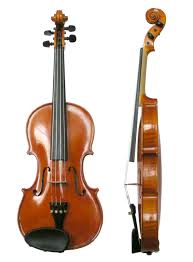记忆方法
1. from Italian violino, diminutive of viola (see viola).
中文词源
violin 小提琴
来自viola,中提琴,-in,小词后缀。
英语词源
- violin
-
violin: [16] Violin has been traced back to Vulgar Latin *vītula ‘stringed instrument’, which was based ultimately on the name of Vītula, a Roman goddess of joy and victory (and has also, via a prehistoric Germanic borrowing, given English fiddle). The Vulgar Latin term passed via Provençal viola and Old French viole into English as viol [15], which survives as the name of an early form of stringed instrument. Its Italian counter-part is viola, which has given English viola [18], and its diminutive form violino is the source of violin.
=> fiddle, viola - violin (n.)
- 1570s, from Italian violino, diminutive of viola (see viola). The modern form of the smaller, medieval viola da braccio.
权威例句
- 1. A performer in evening dress plays classical selections on the violin.
- 一名身穿晚礼服的表演者用小提琴演奏了几段古典音乐。
- 2. She has toiled away at the violin for years.
- 她多年来苦练小提琴。
- 3. She persevered with her violin lessons.
- 她孜孜不倦地学习小提琴。
- 4. The cello is a member of the violin family.
- 大提琴是提琴家族的一员.
- 5. If you increase the tension of that violin string it will break.
- 如果你再拉紧小提琴的那根弦,它就会绷断.

